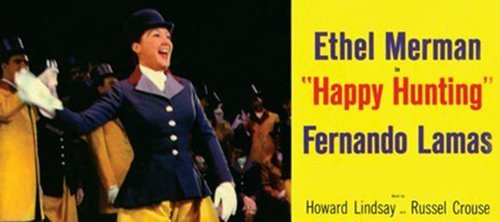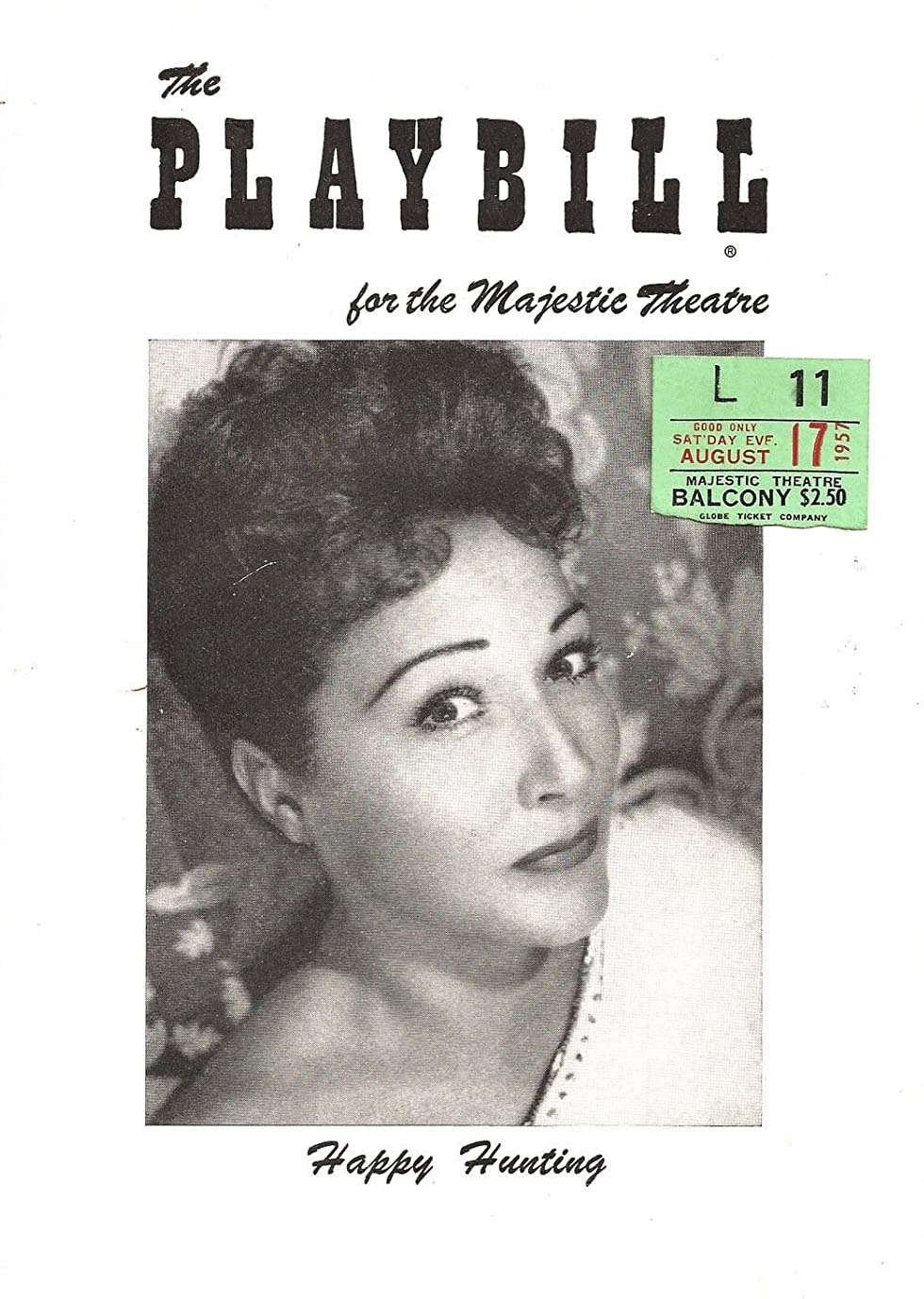Happy Hunting
Musical (1956)

Happy Hunting is a 1956 musical with a book by Howard Lindsay and Russel Crouse, lyrics by Matt Dubey, music by Harold Karr, original choreography by Alex Romero, assistant choreographer Eugene Louis Faccuito (Luigi) . The plot focuses on wealthy Philadelphia Main Line widow Liz Livingstone and her efforts to find a royal husband for her daughter Beth.
Background
After marrying her third husband, Continental Airlines executive Robert Six, in 1953, Ethel Merman retired from performing and happily embraced the life of a Colorado housewife. Six, however, had expected her public appearances to engender publicity for the airline, and her decision to forego the limelight did not sit well with him. He urged her to accept the lead in Happy Hunting, with a book by Howard Lindsay and Russel Crouse (who had written Call Me Madam) and a score by the unknown team of Harold Karr and Matt Dubey. Merman thought the songs were weak but grudgingly acquiesced to her husband's demands.
Initially Merman was pleased with co-star Fernando Lamas, but soon after rehearsals began they clashed when he publicly criticized her performance, and as tensions between them escalated they stopped speaking to each other. Lamas was certain he would be overshadowed by Merman and plotted to draw the focus away from her. Known throughout Hollywood for his unusually large physical endowment, he instructed costume designer Irene Sharaff to cut his pants so they would cling as tightly as possible. On opening night in Philadelphia during the pre-Broadway tryout, his appearance elicited loud gasps from the audience when he stepped out on stage for the first time. Merman was not amused by the vulgar display and demanded his costume be altered.
Throughout the tryout period, Merman expressed her dissatisfaction with both the book and the score, both of which underwent revisions on a regular basis. After the show opened on Broadway, she insisted two of her least favorite numbers be replaced by songs written by her friend Roger Edens who, due to his exclusive contract with Metro-Goldwyn-Mayer, credited them to Kay Thompson.
Production
Directed by Abe Burrows, with musical staging by Alex Romero and Bob Herget, the Broadway production opened with an advance sale of $1.5 million on December 6, 1956 at the Majestic Theatre, where it ran for 412 performances. It closed on November 30, 1957, with Merman happy to see what she considered "a dreary obligation" finally come to an end. In addition to Merman and Lamas, the cast included Virginia Gibson as Beth Livingstone, Gordon Polk as Sandy Stewart, Leon Belasco as Arturo, and Estelle Parsons in her Broadway debut. Jo Mielziner was responsible for the scenic and lighting design.
Liz Livingstone and her daughter Beth arrive in Monaco to attend the wedding of Prince Rainier and fellow Philadelphian Grace Kelly, only to be denied admission when her name cannot be found on the guest list. To save face, Liz pretends her hotel suite was robbed and she had nothing suitable to wear to the ceremony.
Angered by the snub and determined to find her daughter an even better husband than Grace, Liz arranges a date for Beth and the Duke of Grenada, unaware that the hotel's financial problems, which are being investigated by her attorney Sandy Stewart, are due in no small part to the Duke's failure to pay his bills. When she is made aware of the situation, Liz offers to settle his account and move him, his assistant Arturo, and his prized horses to Philadelphia if he will marry Beth, and he agrees to accept her offer.
Back in the States, complications arise when Liz finds herself falling in love with the Duke while Beth finds she is attracted to Sandy. Everything is resolved when Beth and Sandy elope and the Duke agrees to marry Liz, who realizes he loves her for her money but is willing to accept him on those terms.
Act I
"Postage Stamp-Principality" - Tourists and Monegasques
"Don't Tell Me" - Sandy and Beth Livingstone
"It's Good to Be Here" - Liz Livingstone and Reporters
"Mutual Admiration Society" - Liz and Beth Livingstone
"For Love or Money" - The Girls
"Bikini Dance" - Beth Livingstone
"It's Like a Beautiful Woman" - Duke of Granada
"Wedding-of-the-Year Blues" - Maud Foley, Harry Watson, Jack Adams, Reporters, and Photographers
"Mr. Livingstone" - Liz Livingstone
"If'n" - Beth Livingstone, Sandy, and Passengers
"This Is What I Call Love" - Liz Livingstone
Act II
"A New-Fangled Tango" - Liz and Beth Livingstone, Arturo, and Guests
"She's Just Another Girl" - Sandy
"The Game of Love" - Liz Livingstone
"Happy Hunting" - Liz Livingstone, Duke of Granada, and Members of the Hunt
"I'm a Funny Dame" - Liz Livingstone
"This Much I Know" - Duke of Granada
"Just Another Guy" - Liz Livingstone
"Everyone Who's "Who's Who" - Jack Adams, Harry Watson, and Footmen
"Mutual Admiration Society (Reprise)" - Liz Livingstone and Duke of Granada
Aucun dossier informatif complémentaire concernant Happy Hunting
Aucun dossier informatif complémentaire concernant Happy Hunting

Version 1
Happy Hunting (1956-12-Majestic Theatre-Broadway)
Type de série: OriginalThéâtre: Majestic Theatre (Broadway - Etats-Unis) Durée : 11 mois 4 semaines Nombre : 412 représentationsPremière Preview : 06 December 1956
Première: 06 December 1956
Dernière: 30 November 1957Mise en scène : Abe Burrows • Chorégraphie : Producteur : Star(s) : Avec: Gordon Polk (Sanford Stewart Jr.), Olive Templeton (Mrs. Sanford Stewart Sr.), Mitchell M. Gregg (Joseph), Virginia Gibson (Beth Livingstone), Seth Riggs (Jack Adams), Gene Wesson (Harry Watson), Delbert Anderson (Charley), Ethel Merman (Liz Livingstone), Clifford Fearl (Sam), John Craig (Joe), George Martin (Freddy, Albert), Jim Hutchison (Wes, Terence), Estelle Parsons (Mary Mills), Robert C. Held (Dice Davis), Carl Nicholas (Bob Grayson), Mary Finney (Maud Foley), Mark Zeller (Police Sergeant), Leon Belasco (Arturo), Fernando Lamas (The Duke of Granada), Renato Cibelli (Count Carlos), Don Weissmuller (Waiter), John Leslie (Ship’s Officer, Mr. T.), Warren J. Brown (Barman), Florence Dunlap (Mrs. B.), Madeline Clive (Mrs. D.), Kelley Stephens (Mrs. L.), Eugene Louis (Tom), Moe (Daisy), Jay Velie (Mr. M.), Mara Landi (Margaret); Singers: Peggy Acheson, Marilynn Bradley, Deedy Irwin, Jane Johnston, Jean Kraemer, Mara Landi, Betty McGuire, Estelle Parsons, Noella Peloquin, Ginny Perlowin, Mary Roche, Kelley Stephens, Helene Whitney, Delbert Anderson, Edward Becker, Warren J. Brown, David Collyer, John Craig, Jack Dabdoub, Clifford Fearl, Robert C. Held, Carl Nicholas, Seth Riggs, Charles Rule, Mark Zeller; Dancers: Betty Carr, Alice Clift, Jane Fischer, Roberta Keith, Svetlana McLee, Patti Nestor, Wendy Nickerson, Fleur Rapp, Sigyn, Bob Bakanic, John Harmon, Jim Hutchison, Dick Korthaze, Eugene Louis, George Martin, Jim Moore, Lowell Purvis, Don Weissmuller, Roy Wilson
Pas encore de video disponible pour ce spectacle